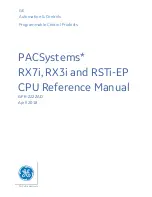
21
7 Maintenance and fault rectification
OPTISWITCH 3100 C • Relay (DPDT)
29953-EN-210702
7 Maintenance and fault rectification
7.1 Maintenance
If the device is used properly, no special maintenance is required in
normal operation.
The cleaning helps that the type label and markings on the instrument
are visible.
Take note of the following:
•
Use only cleaning agents which do not corrode the housings, type
label and seals
•
Use only cleaning methods corresponding to the housing protec-
tion rating
7.2 Rectify faults
The operator of the system is responsible for taking suitable meas-
ures to rectify faults.
The device offers maximum reliability. Nevertheless, faults can occur
during operation. These may be caused by the following, e.g.:
•
Sensor
•
Process
•
Voltage supply
•
Signal processing
The first measure to take is to check the output signal. In many cases,
the causes can be determined this way and the faults quickly rectified.
Error
Cause
Rectification
OPTISWITCH 3100 C sig-
nals "covered" without
being submerged (overfill
protection)
OPTISWITCH 3100 C sig-
nals "uncovered" when
being submerged (dry run
protection)
Operating voltage too low Check operating voltage
Electronics defective
Press the mode switch. If the instrument then changes
the mode, the vibrating element may be covered with
buildup or mechanically damaged. Should the switch-
ing function in the correct mode still be faulty, return the
instrument for repair.
Press the mode switch. If the instrument then does not
change the mode, the electronics module may be de-
fective. Exchange the electronics module.
Unfavourable installation
location
Mount the instrument at a location in the vessel where
no dead zones or mounds can form.
Buildup on the vibrating el-
ement
Check the vibrating element and the sensor for buildup
and remove the buildup if there is any.
Wrong mode selected
Set the correct mode with the mode switch (overflow
protection, dry run protection). Wiring should be carried
out according to the closed-circuit principle.
Maintenance
Cleaning
Reaction when malfunc-
tion occurs
Causes of malfunction
Fault rectification
Checking the switching
signal












































